Colombian President Petro urges residents in Bogota to leave their homes for the weekend to conserve water as reservoir level in the capital plunged to 15.3 percent of its capacity
Colombian President Gustavo Petro is calling on residents to flee Bogotá this weekend as drought-hit reservoirs struggle to supply the capital.
The leftist leader declared Friday a national civil day, giving government employees a day off and asking private companies to do the same to maintain water levels in reservoirs.
“It’s not that people don’t drink water because then we would die,” Petro said during a press conference on Thursday. ‘But it is true that we drink it in a different place, where there is no hydrological stress.’
The president also urged residents to consider cutting back on the amount of electricity they use in their homes so that the country does not have to ration energy in the coming rainy season.
A firefighter sprays water during a forest fire on El Cable Hill near Bogota, Colombia, on January 27. The El Niño weather pattern is blamed for forest fires and the current drought
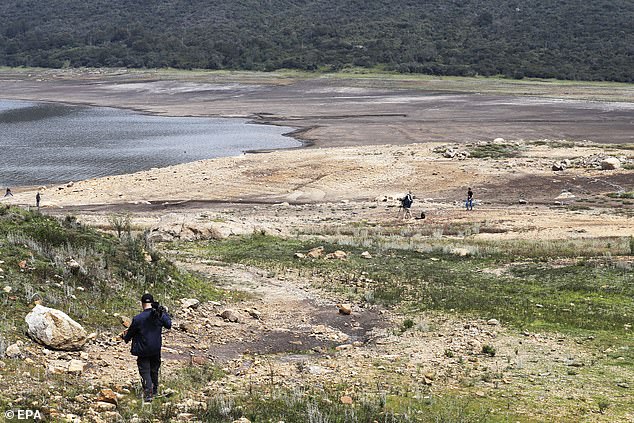
Extensive beaches have formed due to low water levels in the San Rafael Reservoir in La Calera, a city near Bogotá, the capital of Colombia
The lack of rain in the South American country’s northern and central regions devastated Bogota’s reservoirs and sparked forest fires in January.
The Chingaza reservoir system, the main water source, is currently 15 percent full, the lowest ever due to months of dry water caused by the El Niño weather phenomenon.
The average water level in the country’s reservoirs has fallen to below 29 percent. A drop to 27 percent could lead to power outages.
Petro shared a photo of one of the capital’s main water systems and took direct aim at climate change deniers.
“This April 19 is a day of rebellion, of reading, of conversations with family and friends about the danger of climate change, about who is causing it, about what needs to be done,” Petro wrote on X.
“Tomorrow is a day of national rebellion, tomorrow we combine the forces of life,” he added. ‘We dispel the summons of death, tomorrow is the day of life on earth, my day and your day.’
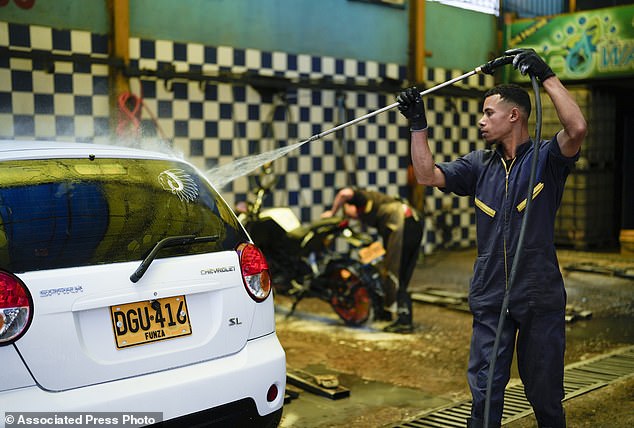
A worker washes a car at an ecological car wash in Bogotá, Colombia, on April 12. Water rationing in the capital began on April 11 due to low water levels in the reservoirs that supply the capital with drinking water, a consequence of the El Niño weather phenomenon
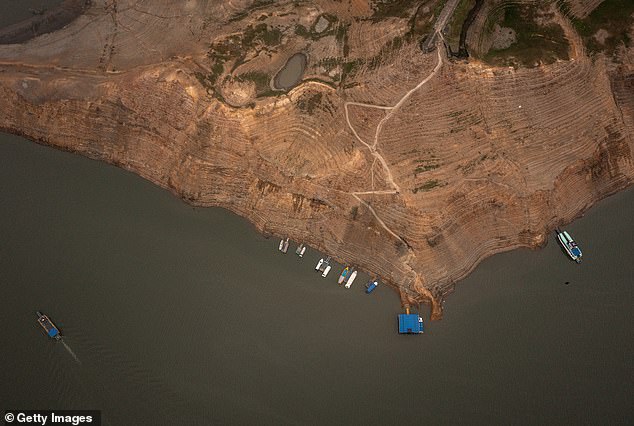
Aerial view of the El Guavio Reservoir dock, one of the water sources for the Colombian capital Bogotá, where the water level has visibly dropped due to a drought that lasted several months due to the El Niño weather pattern
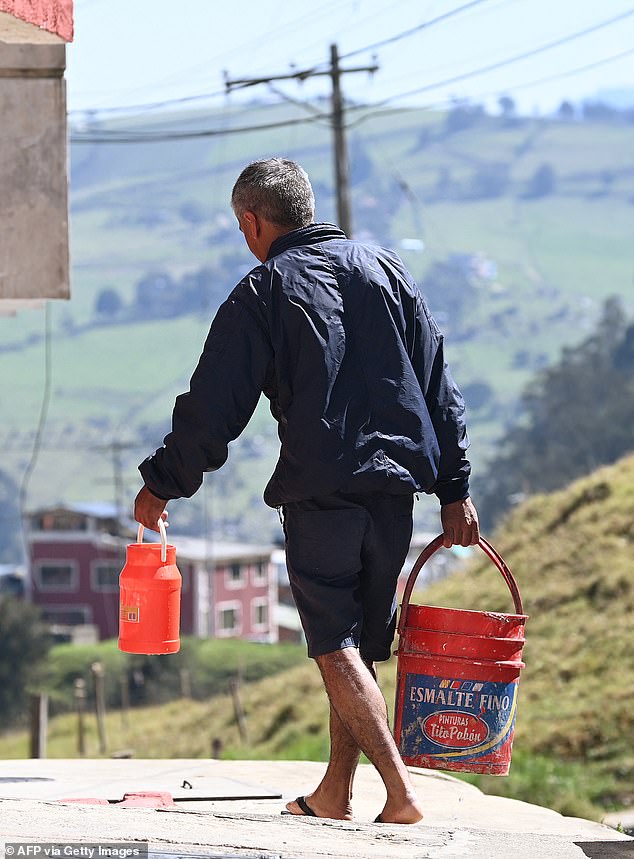
A resident of La Calera, a city north of Colombia’s capital Bogotá, brings water to his home. The area is facing a water shortage as the main reservoirs have been affected by the drought that has lasted for several months
On Monday, Bogotá Mayor Carlos Galán presented a plan to curb water use in the city of 8 million people, announcing that homes that use more than 22 cubic meters of water per month will have to pay extra fees.
Galán warned that people could be fined up to $300 if they wash their cars on the street or perform any other activity considered a waste of water.
For example, city buses are now washed once a week instead of every day. However, for health reasons, the inside of the buses is cleaned daily.
“We have started reducing water consumption, but there is still a long way to go to reach our goals,” Galán said.
Water rationing is rare in Bogotá, a city nestled in a humid stretch of the northern Andes, surrounded by cloud forests and emerald fields.
The Bogotá government introduced a water rationing system on April 11 that divides the city into nine zones. The water supply to each zone is turned off alternately for 24 hours.
The closure saw the capital’s water consumption drop from 17.84 cubic meters per second to 16.01 cubic meters per second.
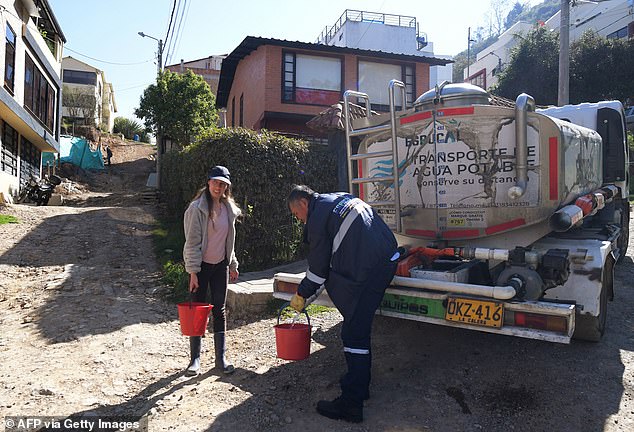
A resident collects water from a water truck in La Calera, a city near Bogotá, the capital of Colombia
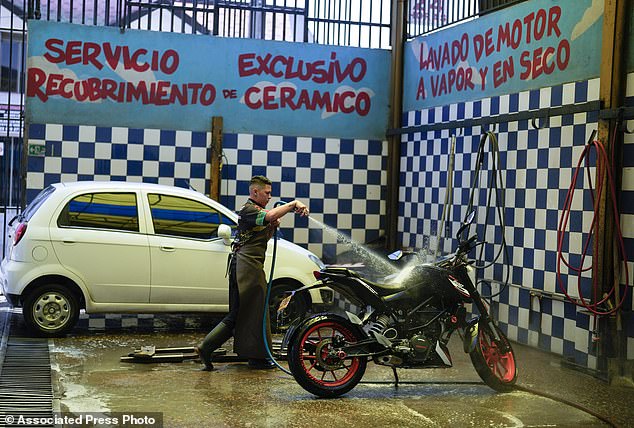
Bogotá Mayor Carlos Galán presented a plan on Monday to curb water use in the city of 8 million inhabitants. Residents who wash their cars on the street can be fined up to $300
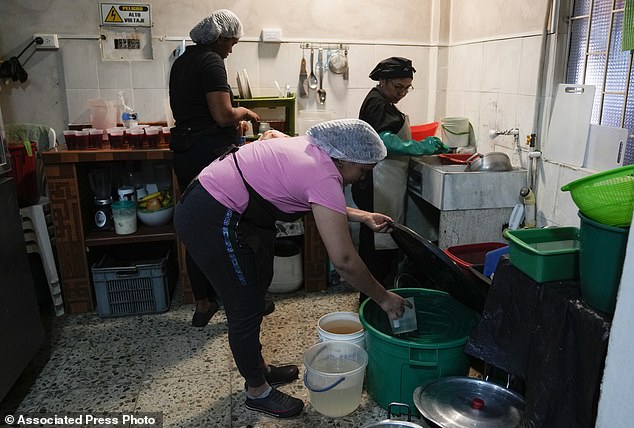
A restaurant chef draws water from a bucket as the kitchen remains open during a 24-hour water restriction in Colombia’s capital Bogotá, which is experiencing drought
Galán’s plan is to reduce consumption below 15 cubic meters per second so that the reservoirs can recover.
City officials have followed the mayor’s lead in sharing tips on how to save water.
Some have asked residents to limit shower time to five minutes and turn off the water when brushing their teeth.
Galán even went so far as to ask residents to consider not showering every day if they don’t have to leave their home.
“We are going to reduce consumption not only by rationing, but also by changing our behavior,” he said.
